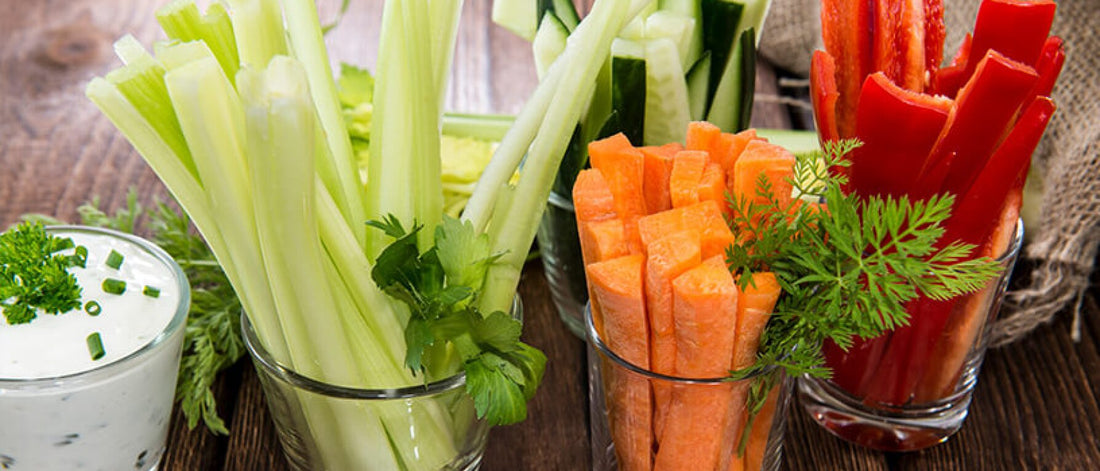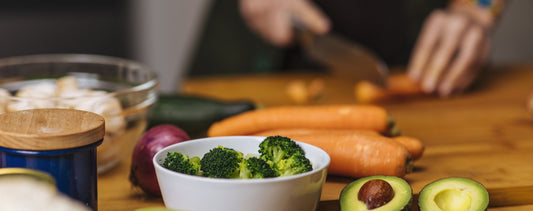Diets are not the answer for long-term weight loss. If you’re tired of losing and gaining the same 20 pounds over and over again, you probably already know that.
For the past 50 years, most people have turned to restrictive diets and intense exercise as the answers to weight loss. However, since the early 1960s the prevalence of obesity among adults in the U.S. has more than doubled.
If you look at the research about dieting, it all begins to make sense. Contrary to popular belief, dieting actually tends to promote weight gain.
A team of UCLA researchers reviewed 31 studies on dieting and found that up to two-thirds of the people who went on diets regained more weight than they lost.
With that in mind, it’s time to ditch the diet and focus on forming healthy habits and keeping them consistent.
Here are six ways to start your journey.
Practice taking five deep breaths before you start eating to help slow down your nervous system. Make sure to chew your food thoroughly before you swallow. You can also try to put your fork down in between bites to help slow your pace.
Waiting to eat when you’re hungry also means that you’re more likely to overeat, eat too fast, or have difficulty making healthy food choices. By eating an afternoon snack, you can prevent low willpower in the evening.
Here are a few snack options to consider:
Foods that are processed, mass-produced, and poor-quality cause inflammation in the body and increase the body’s ability to store fat.
The recommended daily amount of water is half your body weight in ounces. For example, if you weigh 200 lbs., then you should aim to drink around 100 oz. of water per day.
You can help yourself increase your water intake by:
Having built-in accountability to share tips, recipes, challenges, and accomplishments will help you keep on track with your weight loss goals. This support could include a family member, friend, weight-loss support group, health coach, or a nutritionist.
Instead of trying to be perfect, aim for the 80/20 rule. The 80/20 rule means that you should eat food that nourishes your body 80 percent of the time and eat whatever you want for the remaining 20 percent.
If the majority of your food choices consist of high-quality, nutrient-dense meals, your weight-loss results are going to be more successful. It’s not the single cookie or one soda that ruins your weight-loss results.
Start small. Choose one or two of these lifestyle habits to integrate into your daily life. Once they become second-nature, add another one. Soon, you’ll be able to healthily practice all of them.
Remember to focus on consistent lifestyle habits instead of the amount of calories or points you eat each day. You’ll be more likely to succeed with your long-term weight loss.
*Editor’s Note: The information in this article is intended for your educational use only; does not necessarily reflect the opinions of the Chopra Center's Mind-Body Medical Group; and is not a substitute for professional medical advice, diagnosis, or treatment. Always seek the advice of your physician or other qualified health providers with any questions you may have regarding a medical condition and before undertaking any diet, supplement, fitness, or other health program.
Detox and de-stress with a medically supervised ayurvedic cleanse at Perfect Health. The Perfect Health program is a complete Ayurvedic cleanse designed to create balance in both the mind and body through daily Ayurvedic spa treatments, a mind-body consultation with a board-certified physician and Ayurvedic expert, cleansing diet, herbal supplements, instruction in Primordial Sound Meditation, and the Seven Spirital Laws of Yoga. Click here to learn more.
For the past 50 years, most people have turned to restrictive diets and intense exercise as the answers to weight loss. However, since the early 1960s the prevalence of obesity among adults in the U.S. has more than doubled.
If you look at the research about dieting, it all begins to make sense. Contrary to popular belief, dieting actually tends to promote weight gain.
A team of UCLA researchers reviewed 31 studies on dieting and found that up to two-thirds of the people who went on diets regained more weight than they lost.
With that in mind, it’s time to ditch the diet and focus on forming healthy habits and keeping them consistent.
Here are six ways to start your journey.
1. Slow Down
Eating slowly allows the body to feel more pleasure and satiety. This will help you feel satisfied with smaller portions of food.Practice taking five deep breaths before you start eating to help slow down your nervous system. Make sure to chew your food thoroughly before you swallow. You can also try to put your fork down in between bites to help slow your pace.
2. Eat an Afternoon Snack
Many people overeat at dinnertime or at night because of their eating habits during the day. Waiting too long to eat (more than four hours) can cause blood sugar to drop.Waiting to eat when you’re hungry also means that you’re more likely to overeat, eat too fast, or have difficulty making healthy food choices. By eating an afternoon snack, you can prevent low willpower in the evening.
Here are a few snack options to consider:
- Vegetable sticks (cucumber, bell pepper, celery, carrots) with hummus
- Plain organic Greek yogurt with a handful of almonds and some berries
- Apple slices with natural almond butter
- Homemade protein bars
3. Focus on Food Quality
Look for high-quality ingredients in what you eat. Enjoy foods that are fresh, local, organic, homemade, and nutrient-dense. These foods provide nourishment to your body and help support a healthy metabolism.Foods that are processed, mass-produced, and poor-quality cause inflammation in the body and increase the body’s ability to store fat.
4. Stay Hydrated
Being in a state of chronic dehydration makes it difficult for the body to lose weight. It is better to sip on water throughout the day to increase your hydration, rather than chugging water at meal time.The recommended daily amount of water is half your body weight in ounces. For example, if you weigh 200 lbs., then you should aim to drink around 100 oz. of water per day.
You can help yourself increase your water intake by:
- Adding flavor to your water by infusing it with fruit and herbs. You can add mint, berries, a slice of cucumber, or lemon.
- Carrying a reusable water bottle with you. Having water accessible to you at your desk or in your car makes it easier to sip water throughout the day instead of just at your meals.
5. Create Accountability
Surrounding yourself with a positive support team is essential when making lifestyle and dietary changes. In every weight loss journey, there are always challenges along the way.Having built-in accountability to share tips, recipes, challenges, and accomplishments will help you keep on track with your weight loss goals. This support could include a family member, friend, weight-loss support group, health coach, or a nutritionist.
6. Don’t Strive for Perfection
Most diets require you to stick to the rules 100 percent of the time. If you feel restricted on a diet, over time you are likely to start craving the foods that you “can’t” have. This is what often leads people to get off track with restrictive diets.Instead of trying to be perfect, aim for the 80/20 rule. The 80/20 rule means that you should eat food that nourishes your body 80 percent of the time and eat whatever you want for the remaining 20 percent.
If the majority of your food choices consist of high-quality, nutrient-dense meals, your weight-loss results are going to be more successful. It’s not the single cookie or one soda that ruins your weight-loss results.
Start small. Choose one or two of these lifestyle habits to integrate into your daily life. Once they become second-nature, add another one. Soon, you’ll be able to healthily practice all of them.
Remember to focus on consistent lifestyle habits instead of the amount of calories or points you eat each day. You’ll be more likely to succeed with your long-term weight loss.
*Editor’s Note: The information in this article is intended for your educational use only; does not necessarily reflect the opinions of the Chopra Center's Mind-Body Medical Group; and is not a substitute for professional medical advice, diagnosis, or treatment. Always seek the advice of your physician or other qualified health providers with any questions you may have regarding a medical condition and before undertaking any diet, supplement, fitness, or other health program.
Detox and de-stress with a medically supervised ayurvedic cleanse at Perfect Health. The Perfect Health program is a complete Ayurvedic cleanse designed to create balance in both the mind and body through daily Ayurvedic spa treatments, a mind-body consultation with a board-certified physician and Ayurvedic expert, cleansing diet, herbal supplements, instruction in Primordial Sound Meditation, and the Seven Spirital Laws of Yoga. Click here to learn more.






















